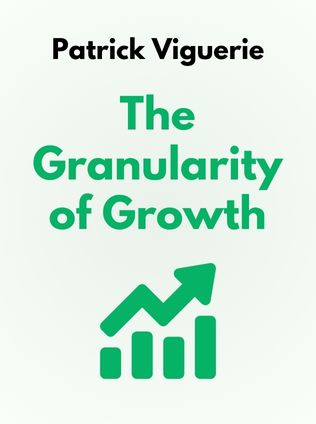
The Granularity of Growth
How to Identify the Sources of Growth and Drive Enduring Company Performance
By Patrick Viguerie,
Published 03/2008
About the Author
Patrick Viguerie is a director at McKinsey & Co. and leads the firm's strategy practice in the Americas. With years of experience and a wealth of knowledge in corporate strategy, Viguerie has been instrumental in helping companies navigate complex growth challenges. Sven Smit, also a director at McKinsey & Co., co-leads the company's strategy practice's initiatives on growth. His deep insights into the mechanics of corporate performance are invaluable for companies looking to achieve sustained growth. Mehrdad Baghai is the managing director of Alchemy Growth Partners, a boutique advisory and venture firm in Sydney. He co-authored the international bestseller The Alchemy of Growth, showcasing his expertise in corporate growth and strategy.
Main Idea
The central theme of The Granularity of Growth is that growth in business is best understood and achieved through a granular perspective. This means breaking down larger markets into smaller, more detailed segments and focusing on the growth opportunities within these sub-segments. The book argues that this granular approach allows companies to better identify, understand, and capture potential growth opportunities, leading to sustained superior performance.
Table of Contents
- Introduction: Grow or Go
- Your Growth Ambition
- A Granular World
- Understanding Your Company's Performance
- Your Growth Direction
- Your Growth Architecture
- Looking in the Mirror
- A Blueprint for Granularity
- Building Scale Platforms
- Cluster-Based Growth
- Choosing to Lead Growth
Introduction: Grow or Go
In today's unforgiving business environment, companies face a stark choice: grow or go. High-growth companies tend to have 5-6 times higher survival rates than low-growth companies. The authors emphasize the importance of understanding the dynamics of growth and adopting a granular perspective to uncover the real sources of competitive advantage and growth.
Granular Performance
Performance is granular, driven by growth in sub-segments and categories within industries. This granular view reveals that the sources of growth are often more complex and nuanced than simple market-share gains. By focusing on these smaller components, companies can better allocate resources and manage their strategies to achieve sustained growth.
"Growth is a tricky topic, so it's important that your company should have a view on the best way to think about it." - Patrick Viguerie, Sven Smit, and Mehrdad Baghai
Your Growth Ambition
To achieve sustainable growth, companies must define their growth ambition clearly. This involves understanding the various levels of granularity within their markets and industries and making strategic decisions based on detailed insights into these levels.
A Granular World
Granularity in business refers to understanding markets and growth opportunities at a fine-grained level. This detailed approach allows companies to develop more precise strategies and better manage their initiatives and activities.
Six Levels of Granularity
The book outlines six levels of granularity:
- G0: World Market - The global marketplace.
- G1: Sectors - Broad industry groups.
- G2: Industries - Specific industries within sectors.
- G3: Sub-Industries by Region - Sub-industries categorized by region.
- G4: Categories by Region - Specific categories within sub-industries.
- G5: Individuals - The level of individual customers and transactions.
These levels provide a framework for understanding and analyzing growth opportunities in a detailed and structured manner.
Sign up for FREE and get access to 1,400+ books summaries.
You May Also Like
Rich Dad Poor Dad
What the Rich Teach Their Kids About Money - That the Poor and Middle Class Do Not!
By Robert T. KiyosakiFreakonomics
A Rogue Economist Explores the Hidden Side of Everything
By Steven D. Levitt and Stephen J. DubnerThe Lean Startup
How Today's Entrepreneurs Use Continuous Innovation to Create Radically Successful Businesses
By Eric RiesWho Moved My Cheese?
An Amazing Way to Deal with Change in Your Work and in Your Life
By Spencer Johnson, M.D.Factfulness
Ten Reasons We're Wrong About the World – and Why Things Are Better Than You Think
By Hans RoslingMake Your Bed
Little Things That Can Change Your Life...And Maybe the World
By William H. McRaven



















